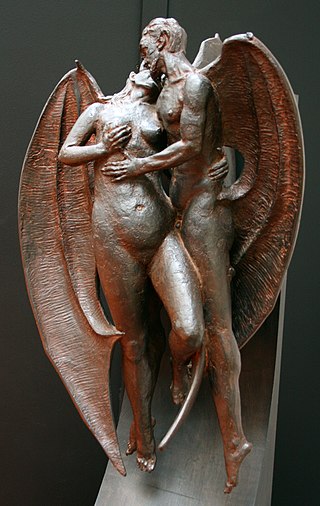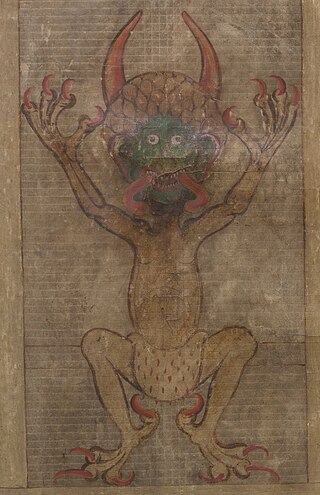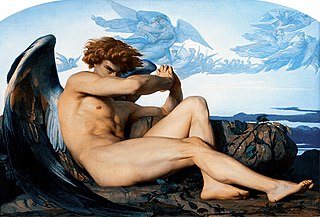Ekwensu is a trickster of the Igbo people, a trickster spirit of confusion, [1] that serves as the Alusi (god) of bargains and the tortoise. [2] Crafty at trade and negotiations. He is often invoked for guidance in difficult mercantile situations. He is perceived as a spirit of violence that incites people to perform violent acts. [3] His companion was Ogbunabali.
Despite contemporary interpretations, Ekwensu was not originally regarded as the devil. [3] With the rise of Christianity, the more beneficent aspects of the deity were supplanted by missionaries who came to represent Ekwensu as Satan. [4] Europeans influenced their beliefs of good and evil to convince Igbo that Ekwensu was Satan-like. [5] The goal of European's influence was to easily colonize the Igbo tribe, forcing them to be fearful of something. [6] Originally, Ekwensu was highly honored as one of the benevolent lunar deities. [7]
The traditional Igbo do not think of Ekwensu as the force that stands in opposition to other beings. Hence, Ekwensu is the OGBO god of war , who guided warriorsin battle. They were tricksters. They only believe in spirits whose nature is either good or bad, but they do have what humans know as an afterlife. [8]
He was the testing force of Chukwu, and along with Ani the earth goddess, and Igwe, the sky god, make up the three highest Arusi of the ancient Igbo people.

A demon is a malevolent supernatural entity. Historically, belief in demons, or stories about demons, occurs in folklore, mythology, religion, and literature; these beliefs are reflected in media including comics, fiction, film, television, and video games. Belief in demons probably goes back to the Paleolithic age, stemming from humanity's fear of the unknown, the strange and the horrific. In ancient Near Eastern religions and in the Abrahamic religions, including early Judaism and ancient-medieval Christian demonology, a demon is considered a harmful spiritual entity that may cause demonic possession, calling for an exorcism. Large portions of Jewish demonology, a key influence on Christianity and Islam, originated from a later form of Zoroastrianism, and was transferred to Judaism during the Persian era.

A devil is the personification of evil as it is conceived in various cultures and religious traditions. It is seen as the objectification of a hostile and destructive force. Jeffrey Burton Russell states that the different conceptions of the devil can be summed up as 1) a principle of evil independent from God, 2) an aspect of God, 3) a created being turning evil, and 4) a symbol of human evil.

Satan, also known as the Devil and sometimes also called Lucifer in Christianity, is an entity in Abrahamic religions that seduces humans into sin or falsehood. In Judaism, Satan is seen as an agent subservient to God, typically regarded as a metaphor for the yetzer hara, or "evil inclination". In Christianity and Islam, he is usually seen as a fallen angel or jinn who has rebelled against God, who nevertheless allows him temporary power over the fallen world and a host of demons. In the Quran, Shaitan, also known as Iblis, is an entity made of fire who was cast out of Heaven because he refused to bow before the newly created Adam and incites humans to sin by infecting their minds with waswās.
Spirit possession is an unusual or an altered state of consciousness and associated behaviors which are purportedly caused by the control of a human body and its functions by spirits, ghosts, demons, angels, or gods. The concept of spirit possession exists in many cultures and religions, including Buddhism, Christianity, Haitian Vodou, Dominican 21 Divisions, Hinduism, Islam, Wicca, and Southeast Asian, African, and Native American traditions. Depending on the cultural context in which it is found, possession may be considered voluntary or involuntary and may be considered to have beneficial or detrimental effects on the host. The experience of spirit possession sometimes serves as evidence in support of belief in the existence of spirits, deities or demons. In a 1969 study funded by the National Institute of Mental Health, spirit-possession beliefs were found to exist in 74% of a sample of 488 societies in all parts of the world, with the highest numbers of believing societies in Pacific cultures and the lowest incidence among Native Americans of both North and South America. As Pentecostal and Charismatic Christian churches move into both African and Oceanic areas, a merger of belief can take place, with demons becoming representative of the "old" indigenous religions, which Christian ministers attempt to exorcise.

Odinani, also known as Odinala, Omenala, Odinana, and Omenana, is the traditional cultural belief and practice of the Igbo people of south east Nigeria. These terms, as used here in the Igbo language, are synonymous with the traditional Igbo "religious system" which was not considered separate from the social norms of ancient or traditional Igbo societies. Theocratic in nature, spirituality played a huge role in their everyday lives. Although it has largely been synchronized with Catholicism, the indigenous belief system remains in strong effect among the rural, village and diaspora populations of the Igbo. Odinani can be found in Haitian Voodoo, Obeah, Santeria and even Candomblé. Odinani is a pantheistic and polytheistic faith, having a strong central deity at its head. All things spring from this deity. Although a pantheon of other gods and spirits, these being Ala, Amadiọha, Anyanwụ, Ekwensu, Ikenga, exists in the belief system, as it does in many other Traditional African religions, the lesser deities prevalent in Odinani serve as helpers or elements of Chukwu, the central deity.
Èṣù is a pivotal Òrìṣà/Irúnmọlẹ̀ in the Yoruba spirituality or Yoruba religion known as ìṣẹ̀ṣe. Èṣù is a prominent primordial Divinity who descended from Ìkọ̀lé Ọ̀run, and the Chief Enforcer of natural and divine laws - he is the Deity in charge of law enforcement and orderliness. As the religion has spread around the world, the name of this Orisha has varied in different locations, but the beliefs remain similar.

Orishas are divine spirits that play a key role in the Yoruba religion of West Africa and several religions of the African diaspora that derive from it, such as Haitian Vaudou, Cuban, Dominican and Puerto Rican Santería and Brazilian Candomblé. The preferred spelling varies depending on the language in question: òrìṣà is the spelling in the Yoruba language, orixá in Portuguese, and orisha, oricha, orichá or orixá in Spanish-speaking countries.
Demonology is the study of demons within religious belief and myth. Depending on context, it can refer to studies within theology, religious doctrine, or occultism. In many faiths, it concerns the study of a hierarchy of demons. Demons may be nonhuman, separable souls, or discarnate spirits which have never inhabited a body. A sharp distinction is often drawn between these two classes, notably by the Melanesians, several African groups, and others. The Islamic jinn, for example, are not reducible to modified human souls. At the same time these classes are frequently conceived as producing identical results, e.g. diseases.

Nsukka is a town and a Local Government Area in Enugu State, Nigeria. Nsukka shares a common border as a town with Edem, Opi, Ede-Oballa, and Obimo.

The beliefs and practices of African people are highly diverse, including various ethnic religions. Generally, these traditions are oral rather than scriptural and are passed down from one generation to another through folk tales, songs, and festivals, and include beliefs in spirits and higher and lower gods, sometimes including a supreme being, as well as the veneration of the dead, and use of magic and traditional African medicine. Most religions can be described as animistic with various polytheistic and pantheistic aspects. The role of humanity is generally seen as one of harmonizing nature with the supernatural.

In Christianity, the Devil is the personification of evil. He is traditionally held to have rebelled against God in an attempt to become equal to God himself. He is depicted as a fallen angel, who was expelled from Heaven at the beginning of time, before God created the material world, and is in constant opposition to God. The devil is conjectured to be several other figures in the Bible including the serpent in the Garden of Eden, Lucifer, Satan, the tempter of the Gospels, Leviathan, and the dragon in the Book of Revelation.
Chike C. Aniakor is a Nigerian artist, art historian, author, and poet whose work addresses philosophical, political, and religious themes relating to Igbo society and the Nigerian Civil War. His artworks are held in major metropolitan museums including the Smithsonian Institution, Nigerian National Gallery of Art, and the Museum fur Volkerkunde in Frankfurt. Aniakor is a prolific writer and has authored over 75 books and articles.
Dystheism is the belief that a god is not wholly good and can even be considered evil, or one and the same with Satan. Definitions of the term somewhat vary, with one author defining it as "where God decides to become malevolent".
Godianism is a neo-Traditional religious movement which was re-enacted in 1948 or 1949 in Nigeria and originally known as the National Church of Nigeria. It propagates an intellectual awakening of the African people and traditional African religions, especially Igbo faiths, as a world religion. The Organization of Traditional Religions of Africa (OTRA) is pan-African association which affiliated with the movement. "It is known for its promotion of world peace."
Agwu Nsi is the Arusi of divination.The earth is inhabited by Agwu, a spiritual entity that goes beyond a mere force. Agwu possesses intellectual and volitive faculties, exerting significant influence on human affairs. Revered as the patron spirit of the dibia (diviner-cum-healer) and the source of inspiration for exceptionally talented individuals, Agwu is closely associated with humanity's pursuit of fulfillment in society. It is believed that Agwu plays a role in enforcing various determinations, with the sick attributing their fate to him, creatively gifted individuals crediting his benevolent influence, and dibia being believed to be possessed by him. This page explores the nature of Agwu's possession, considering it as the culmination of his impact on human beings and examining its manifestation in individuals' experiences. Despite the transformative effects of modernization, Agwu's influence persists.Agwu is also known by other names such as Agwuisi and Agwunsi. While the popularity of these names may vary across different communities, there are no significant etymological differences among them. The simpler form, Agwu, encapsulates the complete essence of the concept. The suffixes isi and nsi, denoting head/first and poison respectively, serve as onomatopoeic expressions representing specific orders of relationships, characteristics, and effects associated with the spirit.Agwu is perceived as embodying tendencies that exhibit drastic moral opposites, often described in dialectical terms such as aka nri agwu (good/positive) and aka agwu (negative); ikenga agwu (support) and uruala agwu (subversion). Unlike other spiritual entities, Agwu is not characterized by a fixed inclination towards aiding or punishing, good or evil. Similar to spirits, Agwu has the capacity to both aid and punish. However, unlike them, he does not exhibit a consistent inclination in either direction.
Igbo culture are the customs, practices and traditions of the Igbo people of southeastern Nigeria. It consists of ancient practices as well as new concepts added into the Igbo culture either by cultural evolution or by outside influence. These customs and traditions include the Igbo people's visual art, music and dance forms, as well as their attire, cuisine and language dialects. Because of their various subgroups, the variety of their culture is heightened further.
Amadioha is the Arusi or Agbara of thunder and lightning of the Igbo people of southeastern Nigeria. He is amongst the most popular of Igbo deities and in some parts of Igboland, he is referred to as Amadiora, Kamalu, Kamanu, or Ofufe. Astrologically, his governing planet is the Sun. His color is red, and his symbol is a white ram. Metaphysically, Amadioha represents the collective will of the people. He is often associated with Anyanwu, who is the Igbo god of the Sun. While Anyanwu is more prominent in northern Igboland, Amadioha is more prominent in the southern part. His day is Eke, which is the first market day of the Igbo four-day week.

Akan religion comprises the traditional beliefs and religious practices of the Akan people of Ghana and eastern Ivory Coast. Akan religion is referred to as Akom. Although most Akan people have identified as Christians since the early 20th century, Akan religion remains practiced by some and is often syncretized with Christianity. The Akan have many subgroups, so the religion varies greatly by region and subgroup. Similar to other traditional religions of West and Central Africa such as West African Vodun, Yoruba religion, or Odinani, Akan cosmology consists of a senior god who generally does not interact with humans and many gods who assist humans.

West African mythology is the body of myths of the people of West Africa. It consists of tales of various deities, beings, legendary creatures, heroes and folktales from various ethnic groups. Some of these myths traveled across the Atlantic during the period of the Trans-Atlantic slave trade to become part of Caribbean, African-American and Brazilian mythology.
Lejja is a community comprising 33 villages in Enugu State of South-Eastern Nigeria. It is populated by the Igbo people and located about at 14 Kilometers from Nsukka. It is the location of a prehistoric archaeological site which contains iron smelting furnaces and slag that dates back to 2000 BC. The village square at Otobo ugwu is likely the first village square in Lejja contains over 800 blocks of slag weighs between 34 and 57 kg. Geophysical investigations have located buried iron slag in several other locations in the community.